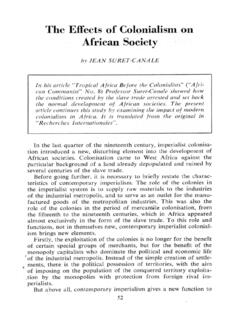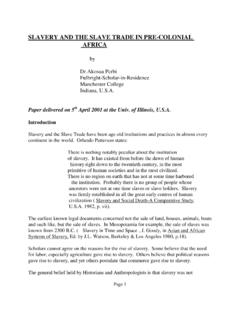Transcription of Scramble and Partition of Africa
1 EUROPEAN INVASION AND THE PROCESS OF PARTITIONS cramble and Partition of Scramble for and Partition of Africa a) Definitions of the terms Scramble and Partition b) Methods used by Europeans to acquire colonies in Africa c) Factors that led to the Scramble for colonies in Africa d) The process of Partition e) Impact of Partition reactions to European colonization a) Resistance: Maji Maji, Mandinka Samori Toure, Ndebele Lobengula. b) Collaboration: Baganda, Lozi-Lewanika Terms: ScrambleStruggle to compete with others in a disorderly manner in order to get something or a share of it. Scramble for AfricaRush by European powers to establish their spheres of influence in Africa in the 19th century PartitionApportioning something among contenders or of Africa Sharing or dividing up of the continent by European powers among themselves Dividing up of regions in Africa among European powers which took part in the Scramble and partitionBritain GermanyFranceBelgiumSpain PortugalItaly Methods used by Europeans to acquire colonies in Africa1)Diplomacy2)Signing )Military Conquest4)Divide and Rule5)Luring/Enticing of Chiefs By giving gifts (cloth, beads, intoxicating drinks, weapons)6)Treachery/Tricks7)
2 Company RuleFactors that led to the Scramble and Partition of Africa Economic to the industrial revolution in Europe in the 19th century, they for their manufactured materials to feed their to invest their surplus traders sought protection from their home countries when faced with for agricultural land in Africa to grow food for cheap labour from Africa to produce raw about the availability of minerals in and the rise of Germany of nationalism proof of a country's prestige/superiority was through acquisition of country that did not acquire colonies would open the gates to political factors The Egyptian question It revolved around the ownership of the Suez Canal Both Britain and France had economic interests in Egypt Their clash culminated in the British occupation of
3 Egypt in order to protect the River Nile and British interests in India. French activities in West Africa and the Congo It accelerated the Scramble for the search for colonies in Africa . King Leopold's (of Belgium) activities in the Congo King Leopold created the 'Congo Free State in 1884 This precipitated a crisis in Africa which culminated in the convening of an international conference in 1884-1885 the Berlin factors1. The Missionary Factor The missionaries came to Africa to spread Christianity, civilize the Africans, abolish slave trade and encourage legitimate trade . In case of problems, they sought for protection from their mother Public Opinion Majority of people in Europe favoured acquisition of Rise of Racialism Europeans felt they were a superior race to others since they were industrialized.
4 They had a duty to civilize Africans Cecil Rhodes once remarked we are the first race in the world and the more of the world inhabit, the better it is for the human Growth of European PopulationThey needed their colonies to act as outlets for their surplus produce 5. Humanitarian factorHumanitarian groups in Europe who had campaigned against slave trade urged their home governments to occupy Africa to facilitate effective abolition of slave process of partitionStarting point of partitioning of Africa began with the Berlin Conference of of the created spheres of influence. Any European power occupying any part of Africa had the obligation to notify others to avoid double conflicting occupation -Any claim of an African territory had to be accompanied by effective power had to stamp out slave trade in their territory and encourage legitimate Zambezi, Congo and Niger were left free for navigation by all European Leopold was recognized as the sovereign ruler of the Congo Free of Africa Britain East Africa -Kenya, Uganda Central Africa -Nyasaland, Northern Rhodesia, southern Rhodesia North East Africa -British Somaliland Southern Africa -Bechuanaland, Swaziland, Basutoland, Union of South Africa .
5 North Africa -Egypt, Sudan West Africa -Gold Coast, Nigeria, Gambia, Sierra Leone. France North East Africa -Eritrea, French Somaliland. West Africa -Senegal, Ivory Coast, Dahomey, Upper Volta, Guinea, Mali, Belgium, Niger, Mauritania. Central Africa -Chad, French Central Africa , French Congo North Africa -Tunisia, Algeria, East Africa -Tanganyika Central Africa -Rwanda, Burundi West Africa -Togo, Cameroon South West Angola, Mozambique, Portuguese Guinea Belgium Belgium CongoItaly Libya, Italian SomalilandSpain Spain Spanish Guinea, Spanish MoroccoAFRICAN COLONIESI mpact of Partition Political of of boundaries of were arbitrarily split into different neighbouring and loss of authority by African of chartered companies to administer of forts and posts to administer of ethnic of European was introduced to world politics by colonizing impact Africa became a source of raw materials and market for European industries Development of infrastructure transport and communication to serve colonial interests Disruption of African traditional economic activities Recruitment of African labour for European economic gains Speeded up economic growth of European countries Increased
6 White settlement in Africa Africa was under-developed due to exploitation of her resources Introduction of large-scale agriculture Created overdependence on Europe by Africa for financial and technical support Introduction of wage labour to Africa Africans were introduced to the international system of trade and impact Erosion of African cultures Establishment of permanent European settlements Africans lost their lives as they resisted European occupation Introduction of western education Introduction of European languages in Africa Brought an end to migrations in Africa Increased missionary activities in Africa Helped curb slave trade and slavery in Africa Introduction of western medical services in Africa Development of urban centres Emergence of racial segregation in Africa .
7 African reaction to European ColonizationAfrican reaction to European colonizationResistanceMaji maji rebellion (1905 -1907)Communities that took part. Zaramo. Matumbi Luguru PogoroBenaCauses of the and harsh German of hut tax and ruthless tax collection of Arab and Swahili as headmen (Jumbes) and chiefts (Akidas) of forced cotton growing disrespect of African culture and missionaries discredited traditional Ngoni were seeking revenge for their 1898 massacre by of religion -Kinjekitile boosted the people's morale by issuing medicinal water to make African warriors immune to German of the Rebellion Kinjekitile Gwale Chabruma Abdalla Mapanda Mputa Gamma Omari Kinjalla of the uprising Kinjekitile administered magic water in1904 Matumbi refused to pick cotton in July 1905.
8 The uprising spread to other parts of South Eastern Tanganyika. Pogoro refused to pick cotton August1905 The town of Samanga was burnt and looted The Ngoni joined the revolt in September1905 In 1907 German government got reinforcement and used scorched earth policy and ruthlessly executed war leaders Many Africans surrendered Some resorted to guerilla warfare, others fled to for the failure of the German weapons and well-trained were of the magic of military unity among coordination of African , imprisonment, deportation and execution of some leaders demoralized the of scorched earth policy by Germans weakened got assistance from Somalia, Sudan and Germany ethnic groups (Chagga, Hehe, Nyamwezi)
9 Did not join in the Africans collaborated with the Germans. the Hehe .Results of the such as forced labour and taxation were were involved in administration as Akidas and medical and educational facilities for of corporal growing programme was dropped were encouraged to grow cotton for their own became an official up of a colonial department in 1907 to investigate and monitor the affairs of the learnt the importance of unity in fighting against a common inspired other Africans who were later to organize nationalist due to great loss of of property (houses, crops) of war of the revolt caused ill-feelings among the to severe disrupted economic and execution of African African confidence in traditional Mandinka -Samori Toure's Resistance (1891-1898)Factors that enabled Samori to create a large 10 years (1858 -1867), he was a guerilla of diplomacy Samori expanded his authority into parts of Futa Jalon and Tokolor territory by means of diplomatic alliances with his fellow Tijaniyya Brothers of the used marriage relations in extending his territory was a military genius.
10 He established a skilled and mobile cavalry force backed up by a well-armed infantry. His soldiers were loyal and well trained. They were also well equipped with guns and modern rapid-firing used his expertise in trade to secure for the army the horse and weapons it established a well coordinated and efficient was a prime factor in Samori's creation of a large empire. His people were bound by the Islamic faith and fully supported Samori had a charismatic personality, which inspired intense loyalty and devotion among his of Franco-Mandinka war (1891-1898) wanted to safeguard the independence of his protect the Bure gold modern fire arms and well trained was wealthy and hence had confidence to French were selling arms to Samori's enemies such as Tieba of Sikasso, in order to weaken the a Muslim.






